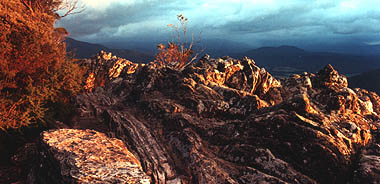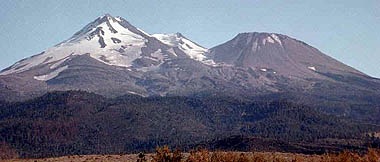|
Eti
Who? - What is this etiquette stuff?
In its simplest sense etiquette is good
manners or appropriate behaviour. In a
deeper sense it is an undefinable respect
for life and its processes both physical
and spiritual. Ultimately, it is doing
the right thing, in the right place at
the right time and in the right state
of mind (or for the Zen practitioner,
no-mind).
Practising etiquette is an exercise in
mindfulness, it is the Tao (way), it is
Zen, it is enlightenment ... and as a
bonus, it will make you a much nicer person
to be with ;-)
We abide in a world of boundaries. The
uncharted wilderness of 200 years ago
is now a National Park, often a farming
district or zoned residential. No matter
where you go, it is quite likely that
some one has laid claim to the dirt you're
standing on. Research your adventures
and don't just blunder around. Seek permission
as is appropriate. Ultimately we are all
just guests in this life, just passing
through a small corner of eternity. Always
be a good guest ... who knows? ... you
might even get invited back!

What
You Take There
and What You Leave Behind
On a Practical Level
Most outdoor activities like camping,
trekking, hiking and similar, do possess
an element of risk and therefore require
adequate preparation. Don't expect to
spend 40 days and nights in the wilderness
surviving on a canteen of water and a
box of sun dried raisins (unless of course
your name is Jesus Christ). Every year
people come to unfortunate ends due to
a lack of preparation and respect for
what are casually referred to as "outdoor
activities". Make sure you are fit (mentally
and physically) and appropriately equipped.
On a Mental and
Spiritual Level
"No matter where you go, there you are",
ego in the disguise of personality is
with us at all times. We carry it along
with us in ways that are often very subtle,
like the gossamer threads of a spider's
web, hardly tangible.
To be mindful is "taking care of business",
full attention on the task or experience
before us. To go to a Place of Power with
a shopping mall mentality (or anywhere
else, other than a shopping mall) is to
miss the point entirely.
Taking a portable CD player so that you
can listen to your favourite Zazen album
while you hike, may provide you with the
comfort of familiarity, but it is really
just another mask, a distraction and filter
that separates you from the experience.
You might as well watch some one else's
video, and save yourself the legwork.
There's no point to visiting the Himalaya,
if all you are going to do is walk around
looking at mental pictures of home while
you are there.
Places of Power have the ability to magnify
states of mind. Rama recommended that
one should not take one's emotional garbage
and disturbed states of mind to such places.
Before you leave home, make sure your
energy is tight. If your mind is clear
and focussed when you arrive, then the
experience will be all that it can be.
Existence is
interactive! Going to a Place
of Power will change you, and you in turn
will change that place. This is another
reason why Rama insisted that students
should not go to Places of Power in confused
or negative mental states. In the same
way that it is uncool to leave your physical
rubbish behind (cans, food wrappers etc.),
it is seriously bad form to leave your
negative energy behind. If in doubt, look
up the term "pollution".
Ideally, like a good camper, you should
leave the environment in the same state
that you found it, so that others may
equally benefit from this resource.
On a related note ... Avoid the temptation
to "improve" the place. It is a human
trait that we can always find some excuse
to impose our will on our surroundings.
In this case the saying "if it ain't broke,
don't fix it" applies. The point of being
there is to change yourself, not the environment.

A Final Note
So you've found a great spot, what to
do? Do you keep it to yourself, tell friends,
tell the world. It is a sad fact that
publicising any good thing is likely to
lead to its ruin. The 70's band The Eagles
(album Hotel California) wrote a poignant
song called "The Last Resort" which ends
with the line "call some place paradise,
and kiss it goodbye!"
This is a sad, but accurate indictment
of the fact that most people believe that
natural beauty and power can somehow always
be enhanced by human intervention. This
attitude still persists, even though history
has repeatedly proven it to be wrong.
At the same time it can be argued that,
with 6+ billion people in the world, no
place will remain a secret indefinitely.
There were probably many who came before
you, and more who will come after. So
we are left with discretion. Ok, so nothing
is permanent ... but that doesn't mean we
need to toast the planet today.
Journey well!
|

